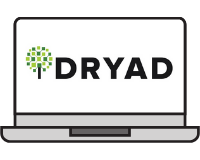 Dryad is a curated, general-purpose data repository built on open-source software that is intended for sharing, publishing, and preserving publicly available research data from peer-reviewed publications in the basic sciences and medicine. Note: Dryad is a non-profit venture supported in part by data publication charges.
Dryad is a curated, general-purpose data repository built on open-source software that is intended for sharing, publishing, and preserving publicly available research data from peer-reviewed publications in the basic sciences and medicine. Note: Dryad is a non-profit venture supported in part by data publication charges.
Compare Dryad to other options in the Harvard Biomedical Repository Matrix.
Please contact us if you have any questions or suggestions about the content of this page. Last updated: 2023-11-13
Features & Specifications
Data Size and Format
File Size Limit: No specified amount; no limit on storage space per researcher
Dataset Size Limit: 300GB/dataset
Data Types and Formats Hosted: Prefers all data be submitted in non-proprietary, openly-documented formats that are preservation-friendly. Will accept other file types, if they are "community-accepted" format. Do not accept submissions with personally identifiable information.
Data Licensing
Waiver: Creative Commons Zero (CC0) Any data submitted will be published under the CC0 license. Does not currently support any other license types, nor allow for restrictions on data access or use.
Data Attribution and Citation Tools
Each dataset published receives a DOI for the data submission as a whole. A suffix is added to the DOI when a data file or dataset is revised to enable version control.
User Access Controls
Option to Share: Can be shared anonymously and securely with editors and reviewers at the subset of journals that have integrated repository into their editorial workflow. After publication, data will be publicly available immediately unless the author or journal has requested a short-term embargo prior to data release associated with a peer review.
Data Access Tools
Search: Machine Readable metadata, primarily consists of keywords and information about the associated publication. Detailed, file-associated metadata are not records and thus not searchable. Uses the DataCite metadata schema.
Download: All datasets are free to download when published. Individual file downloading, multiple API's for programmatic data and metadata access
Proprietary File Format Access: None
Data Analysis: None
Cost
$120 data publishing charge unless funded by the institution, publishers or funders. Users can download datasets free of charge once they are published.
Other Features
Pros
- Researcher can provide data securely and anonymously to editors and reviewers during the peer-review process (if journal is integrated with Dryad)
- Publicly share data associated with a publication in a central, general data repository
- Seeking a DOI for a published dataset or group of related datasets
- No limits on storage space per researcher
- Fully documented API available for direct integration.
Cons
- Not designed for sharing data that is not associated with a publication
- Proprietary file types are accessible only to users with access to the necessary software
- Cost of depositing large datasets may be prohibitive